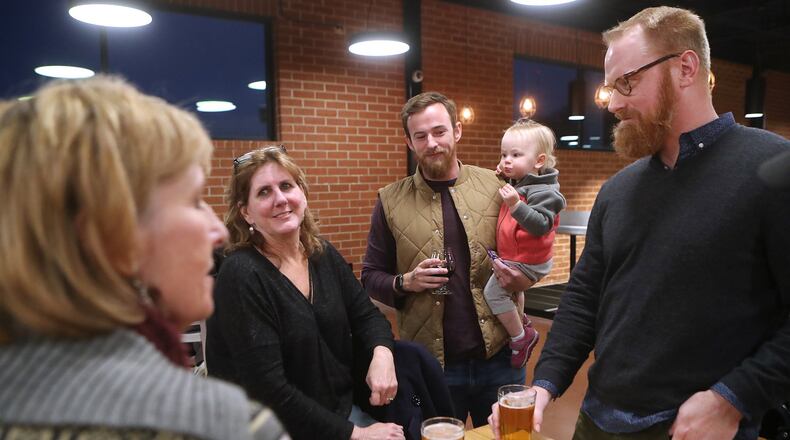A typical afternoon in the middle of the week would find Chelsea Goddard picking up her kids from school while her husband is at work. These aren’t typical times.
Goddard’s husband is a furloughed federal employee, and with his next paycheck coming who knows when, they have swapped roles.
“I went out and got a job as a waitress, so my husband is taking the role of stay-at-home parent,” she said from her Coweta County home Wednesday afternoon. She was taking a break from studying the menu of Nic and Norman’s, the Senoia restaurant co-owned by “The Walking Dead” star Norman Reedus, to prepare for her first training shift. Her husband, who didn’t want to be named, and whose agency they didn’t want identified, had gone to pick up the children.
“It’s a big adjustment,” said Goddard, whose husband is a military veteran. “He’s a hero. He’s worked for the government his entire life.”
Nearly 16,000 Georgians, or about 22 percent of the state’s federal civilian workforce, have been furloughed or working without pay during the partial federal government shutdown.
“It’s frustrating. As federal employees, we’re a pawn in a chess game,” said Cobb County resident Donna Bowman, senior information technology project manager for the U.S. Department of Housing and Urban Development. “I’m a veteran. I am 54 and I joined the Army when I was 21. I’ve spent 33 years of my life serving our country. To see something like this is really disheartening.”
Friday marked the first payday without a paycheck for the roughly 800,000 affected federal employees nationwide, more than half of whom have had to continue working.
“I’m single. I help support my parents,” said Bowman, who is on furlough. “My mom called me one day last week and said, ‘What should I do about my electric bill?’ She is concerned. She relies on me.”
RELATED:
» Georgia feels impact from partial federal shutdown
» Employers confused by loss of background check during shutdown
Many locally impacted federal employees work at Hartsfield-Jackson International Airport, including David Kirsh, who lives in Senoia. An airway transportation systems technician deemed “essential,” he has been reporting to work as usual at the Hartsfield-Jackson air traffic control tower, working 10-hour shifts to maintain equipment, with no idea when his bank account will reflect his efforts.
“Our obligation to our debtors is not changing and we have to keep working, but we’re not being paid,” said Kirsh, a U.S. Marine Corps veteran. “There’s all this stress. But we still want to provide the safest airspace there is.”
Kirsh and his wife, Krista, have been taking a hard look at their budget, wondering if they’ll have to sell their home to avoid defaulting on their mortgage and trying to figure out which bills they can afford to pay, and when.
“My wife and I will have to get together and prioritize who gets paid and who doesn’t,” he said.
The shutdown, the nation’s longest as of Saturday, began on Dec. 22. President Donald Trump, who wants $5.7 billion for a U.S.-Mexico border wall, and congressional Democrats, who aren’t budging, have been at an impasse. The Democratic-controlled House voted on Friday to fund and reopen several agencies, a move that got nowhere with the Republican-controlled Senate.
“It’s an unfortunate situation to feel that arguments in D.C. are being put on the backs of federal workers,” said Dan McCabe, a controller at the Federal Aviation Administration’s Atlanta Air Route Control Center in Hampton. With many of his colleagues furloughed, preparation for the huge influx of flights expected ahead of the upcoming Super Bowl has been forced into a holding pattern, he said.
“When we work events as busy as the Super Bowl, it takes a lot of planning, a lot of foresight, a lot of strategic planning,” McCabe said. “Those meetings have been canceled.”
The Atlanta Journal-Constitution connected with more than a dozen federal employees and their family members this week, most of whom didn’t want to be named for fear of reprisals. They expressed anxiety about mounting bills now, dread the backlog once they do return to work, and are dismayed at leaving their posts unmanned in the meantime.
An IRS manager in Atlanta who isn’t supposed to talk to the press said she could miss two or three paychecks, then would need to find other work to survive financially. She agonizes over her lower-paid colleagues, with whom she has been on the job without pay.
“It breaks my heart,” she said.
A National Park Service ranger, one of just a few on duty locally, cruised by the Chattahoochee River National Recreation Area’s Paces Mill Unit in Vinings the other day as a group of hikers were picking up trash. The weary-looking ranger was not authorized to speak to the media, but she did spend a little time chatting with volunteers and saluting their efforts before heading on.
“There’s got to be an answer,” said volunteer Elizabeth Marsala, who thanked the ranger for persevering.
Jeffrey Fleming, assistant regional director for external affairs in the U.S. Fish and Wildlife Service’s southeast region, has been working without pay but is most concerned about his colleagues.
“Folks go into this line of work because they love it,” the 15-year veteran said. “It’s an awesome place to work. We are blessed with a lot of folks who have a lot of passion, a lot of creativity.”
He misses seeing them. His Atlanta office usually hums with the energy of around 180 employees. These days only a handful — those whose jobs are funded by outside sources — are around.
“If you’re 15 years into your career, you probably have a little bit of a rainy day fund,” Fleming said. “But if you’re just getting started, maybe you’re not as liquid as you might be. I’m worried about some of the folks on the bottom half of our pay scale.”
RELATED:
» Can federal shutdown workers get unemployment benefits? Yes ... and no
Chip Daymude, who works for the U.S. Department of Agriculture’s Food and Nutrition Service arm, has been spending more time with his 18-month-old, Penny, during the shutdown. The family is getting by on his wife’s income as a nurse, and he feels confident about eventually receiving back pay, as he has following other shutdowns. But he frets for the colleagues who are married to other federal workers and have no income at the moment, and for the contractors who face a return without pay for lost time.
“Those are my co-workers, those are my friends,” Daymude said. “It’s hard to see them punished for something they didn’t do.”
He stressed that despite the uncertainty of the moment, he has no complaints.
“I still really love being a federal employee. The benefits far outweigh the sacrifice,” said Daymude, whose agency works with the Supplemental Nutrition Assistance Program (SNAP) and the Special Supplemental Nutrition Program for Women, Infants and Children (WIC). “My favorite thing about my job is feeding hungry babies.”
Agriculture Secretary Sonny Perdue, Georgia’s former governor, has announced the programs are funded through February.
On Thursday night, Daymude and Penny joined a few other feds at SweetWater Brewery, which was offering a couple of free brews for any furloughed worker. Maureen Hill, an archivist at the National Archives and Records Administration, has weathered prior shutdowns and is using this one for personal enrichment. Senior University of Greater Atlanta in Tucker offers an array of courses, and Hill highly recommends “Quantum Physics for the Layperson.”
“I’ll be doing this until I go back to work,” she said. “I think I’m going to take the geology class tomorrow.”
Sharing the table were Daria Labinsky, an archivist at the Jimmy Carter Presidential Library and Museum, and her husband, Stan Hieronymus, author of several books about beer.
“We have savings, so we aren’t living day to day,” he said. “We appreciate that there are people who are.”
Staff writer Matt Kempner contributed to this article.
Keep Reading
The Latest
Featured







